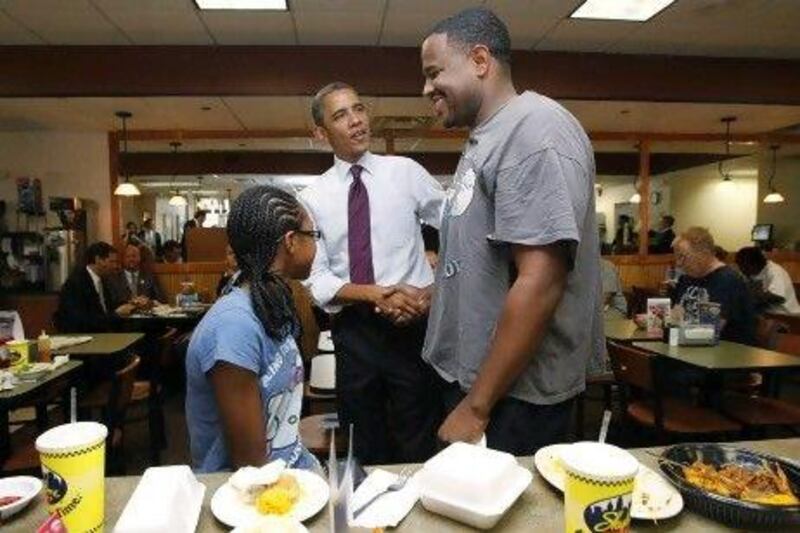WASHINGTON // There was only one customer on a recent afternoon at the Hollywood Barbershop in the Shaw area of Washington DC, a historic African-American neighbourhood. That didn't prevent Carl Johnson, 36, the only barber on duty, from invoking the shop's cardinal rule.
"No politics," he said. "It only causes problems."
He might have been summing up the predicament of Barack Obama, the first African-American US president, whose bid for re-election on November 6 has hit unexpected turbulence in the form of a determined fight by Mitt Romney, his Republican challenger.
It is not only the efforts of his opponent that have taken a toll, however. The thrill is gone, in the words of BB King, the legendary blues guitarist, who will play next month at the Howard Theatre, a block from Mr Johnson's barbershop.
In 2008, Mr Obama rode to victory in part thanks to an unprecedented election-day turnout by African Americans eager to see the first black president. He secured 95 per cent of the black vote and made history.
Four years later, Gallup's tracking poll for the first week of October showed that a whopping 91 per cent of African Americans still approve of Mr Obama's record. But that does not disguise an almost tangible lack of enthusiasm.
There are few election posters up in Shaw, certainly no iconic ones. And analysts say that Mr Obama's chances of re-election may be hurt if his high approval rating does not translate into people turning out to vote.
The "novelty" has worn off, said Daryl Harris, the chairman of the department of political science at Howard University.
The historically black university, also in Shaw, was founded in 1867 to serve the African-American clergy in the aftermath of the civil war that ended slavery. "With the excitement not being there, and if the numbers don't come out, it could obviously make the race even tighter," said Mr Harris.
The vote will not go to Mr Romney. The Republican is unlikely to garner much more than the six per cent of the black vote a New York Times/CBS News poll in September suggested he might get.
The concern for the Obama campaign is that a lack of enthusiasm will affect turnout in crucial swing states such as North Carolina, Florida and Virginia, where African-American voters make up about one in five of the electorate.
Democrats have to get people out to vote, said Khadija Tribble, a political consultant whose Tribeca Consulting Group works on political campaigns in the DMV area - Washington DC, Maryland and Virginia.
"The area is solidly Democratic," she said about the African-American community. But there is less enthusiasm to vote, in part because Mr Obama no longer inspires the same feelings he once did, she added.
This time around, Mr Obama is not the first black presidential candidate with a real chance of victory.
Mr Harris pointed out that until Mr Obama showed he could last the distance, most African-American voters supported Hillary Clinton's bid for the presidency in 2008.
In 2012, Mr Obama has a record - and it is mixed. The US recession hit African Americans hard. While overall unemployment in the country recently came down to 7.8 per cent, it has hovered around 14 per cent for African Americans since 2009 and throughout Mr Obama's presidency, according to statistics from the Economic Policy Institute, a think tank in Washington DC.
And with median white incomes 20 times that of median black incomes, according to Pew Research Center, African Americans have also suffered a disproportionate amount of housing foreclosures in the same period.
Mr Obama's refusal to entertain specific policies to improve the situation for the African-American community - even while promoting gay and lesbian rights - has therefore invited criticism, said Ms Tribble.
"Folks are still going to support him because they are Democrats," she added. "But they're not as hopeful as they once were in terms of this president being a true champion of African-American rights."
But Mr Obama never promised he would pursue specifically African-American policies, noted Mr Harris.
On the contrary, he said, Mr Obama has been "less willing to be seen as taking a stand on race-conscious public policies".
Mr Harris rejected the notion that that was the primary cause of any lack of enthusiasm among black voters. After all, he said, Republicans do not offer African Americans much, and black voters would support the Democrats whoever was on the ticket.
After high expectations in 2008 met reality, Mr Harris said, it was natural that people were less excited.
Do not mention that to James Patterson, 76, whose ramshackle home-improvements shop a few doors from the Howard Theatre boasts several pictures of the Obama family.
"Bring me anyone who tells you they are not going to vote - I will change their minds in minutes," Mr Patterson said this week.
The "young people" do not understand their history, he added, pointing to pictures of what he said was the cotton farm in South Carolina where he was born and grew up.
"To get from where we were to this man in the White House? That meant a lot," he said. "To go out and vote for him if you are black? It's just common sense."
Even Mr Johnson was willing to bend his own barbershop rule for this. "I'll vote for Obama. Don't know no one who won't."






